5 Keys to Running a Successful Sports Camp
If you were fortunate enough to attend a summer camp for your favorite sport, then you undoubtedly have some fond memories. A smile comes to your face as your mind thinks back to your favorite coach. Maybe you even feel a surge of energy as you summon images of yourself getting better every single day.
Being the coach who affords kids in your town that same opportunity is an amazing thing. The ability to change their lives, and yours, is available for the taking.
The reality is that there are now more sports camps than ever for young athletes. What does it take to run a camp that’s a positive, memorable experience for all involved?
I own and operate World Cup Soccer Camp, one of the most popular soccer-specific camps in New England. WCSC was founded at the request of many parents who were disillusioned and disappointed with the lack of instruction and subsequent lack of improvement offered at previous camps their children had attended. Our three core principles: Character, Skills and Tactics, and Fun, has led hundreds of campers to attend WCSC each year.
In this article, I’d like to highlight five areas I believe key to running a successful sports camp.
I’m not going to lay out a full curriculum for a five-day soccer camp. If you are looking for that kind of information, you probably aren’t the right person to be operating a camp to begin with.
What I’m going to give you is what I believe is the “Secret Sauce” that elevates a sports camp from “meh” to “magnificent.”
The following will allow you to create something so special parents will demand to know the dates for next year’s camp and will instantly enroll their kids the day registration opens in January for a July camp.
1. Don’t Focus on Money
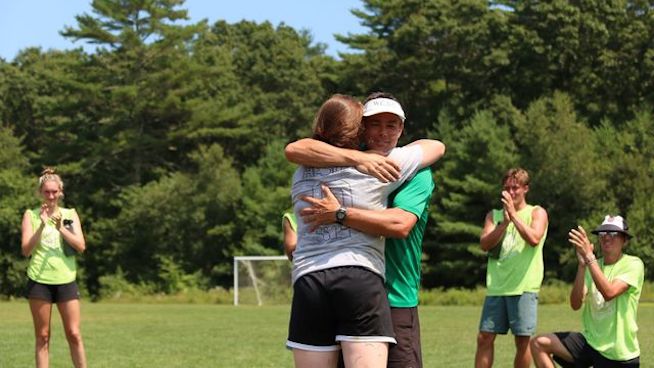
Operating a sports camp can be extremely lucrative. A soccer camp, for example, can be an absolute cash cow. However, that only happens when cash is not your primary goal with your camp.
Parents and athletes know a cash-grab when they see it, and with the current youth sports climate, there are more out there now than ever!
Don’t focus on the money. Set your eyes and heart on serving the kids in your community like no one else!
If you’re going to run a camp, make sure you are doing it to meet the needs of the kids. You can’t go wrong when the focus is building skills and character.
If an athlete leaves feeling their individual skills and tactical knowledge of the game improved, and their parents believe they also built better character and had fun doing so, it’s a home run every time.
Obviously you want to make enough money to cover expenses and turn a profit. But when all of your decisions revolve around those factors, the quality of your camp seriously suffers.
I may spend the least amount of time on this topic, but it could be the most important. Do some soul searching as to why you want to run a sports camp, write it down, and remind yourself of that every single day!
2. The Experience Matters Most
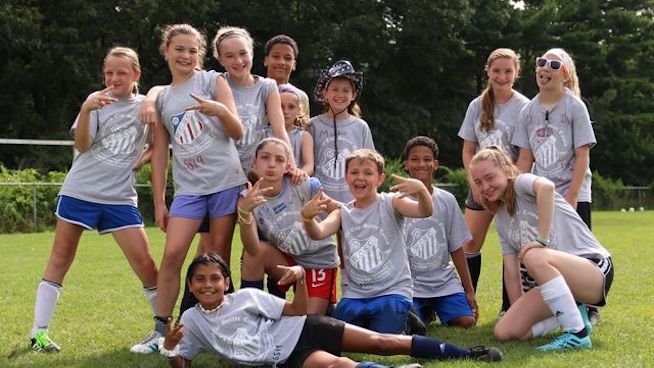
The experience your campers have while in your care is 100% the most important aspect of what you do.
Every moment, every conversation and every interaction should be a positive one. Your campers should have fun, be challenged, gain confidence and build friendships. Every single camper matters.
The experience of your campers is the best advertising you’ll ever get. If they have a positive experience, you’ll create little walking commercials and their parents will tell everyone willing to listen about the camp. This is what I like to call marketing from the inside-out, and it’s how you grow a camp year-over-year.
The experience your campers have will be a reflection of how they are treated, communicated with, and coached. This starts with you, and how you select and treat your own staff.
3. Choose Your Staff Carefully
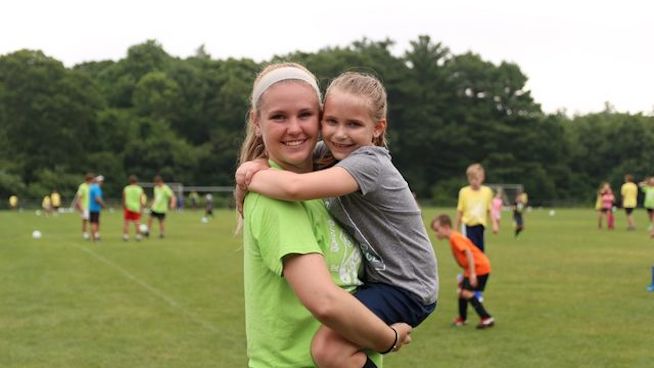
You may be the heartbeat of your camp, but your staff will be the backbone of your camp.
You want staff who enrich the lives of the campers. However, you also want the staff themselves to have a great experience, as well.
Enrich the lives of your staff, and you’ll have them applying to work with you every season. I believe motivated, positive high school and college athletes often make for the best staffers.
You want a staff that embodies selflessness, servanthood, enthusiasm and positivity. If you can accomplish this, the energy of your camp will be off the hook from check-in on Monday morning until the last camper drives off on the final day.
Once your camp runs long enough, your best staff will often be former campers! They already know the deal! When hiring staff, you’re hiring the person. If they have an insatiable will to help others, they will be a great fit. If they’re just out to make a few extra bucks, they’re not there for the right reasons.
Having a graduated system of advancement will prove critical for your camp as well for the life lessons it can teach your young staff.
At my camps, the ascension to Head Coach looks like this:
1. Leader (Volunteer Position): Leaders earn community service hours. Typically, this position is for 8-12th grade club and HS players.
2. Assistant Coach: Assistant Coach is a paid position given more responsibility than that of the Leaders. These coaches are usually high school or college athletes who’ve proven themselves to be valuable staff.
3. Head Coach: Head Coaches are responsible for their individual teams as well as the Assistant Coach and Leader assigned to them. Assistant Coaches who’ve proven themselves to be fantastic staffers often become a Head Coach.
This system works awesome!
While this delegation of responsibility is important for a smooth camp experience, make sure your staff knows they are all of equal value, no matter what their role.
The experience of each and every camper is dependent on your staffers being the best version of themselves, setting a great example, and teaching the game!
They are a team who will learn to put individual needs and egos aside for several days in order to serve others. It will blow your mind how much a young coach will step up if given the opportunity.
The sense of self-worth and accomplishment along with the greater knowledge of the game they’ll possess by the end of the week will be worth far more to them than the community service hours or paycheck they receive.
4. Have a Theme of The Day
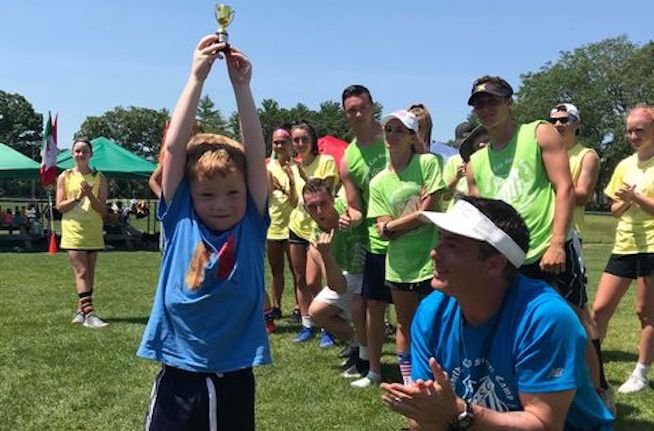
Having a Theme of the Day comes in two distinct forms: character-based themes and participation-based themes.
A character or behavior-based theme to help these little humans grown comes first and foremost. These themes are essentially a single fact or idea you return to throughout the day in order to drive home its importance.
Examples include:
- Attitude: Your attitude, not your aptitude, will determine your altitude. I always like to use this one early in the week and emphasize identifying and rewarding great attitude. You can always control your attitude!
- Patience: The lesson here is that getting better at any skill or sport takes time and effort, and it happens in very small increments. But if you keep at it, those small increments add up over time and make a huge difference.
- It’s Not Luck: The best players did not get to where they are by luck! Remind players that the skills they learn at the camp can be practiced at home, too.
- Be a Hero: Talk to your campers about what it means to be an everyday hero. Smile at people, sit with someone at lunch who’s sitting alone, and helping out at home are all examples of being an everyday hero.
Now take these examples, come up with your own themes (or steal the ones you like best), then Set, Guide and Anchor.
Set the stage in the morning by talking about the theme. Guide the theme throughout the day by looking for opportunities to bring it up. Be super consistent with your messaging! Then, Anchor it down at the end of the day by selecting a Camper of the Day who exemplified your theme.
Then, there’s the participation-based themes.
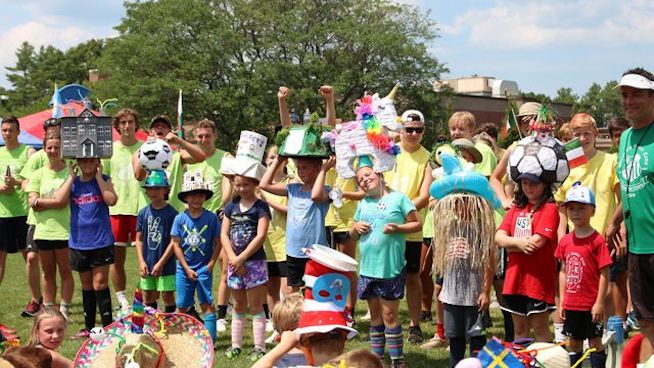
This is just super fun and cool for the campers. Examples include:
- Crazy Sock Day: Campers arrive to camp with the craziest socks they can conjure.
- Crazy Hat Day: Keep the fun going with having the campers decorate or create crazy hats to bring with them the next morning.
- Dress the Coach Day: This one is a blast for the kids. Best done towards the tail-end of camp, allow the campers to bring in whatever they want their Head Coaches to wear for the second half of the day!
Being part of a team also entails participation as well as encouraging others. Whatever the kids come up with is to be celebrated if they put in the effort!
5. Communication is the Glue
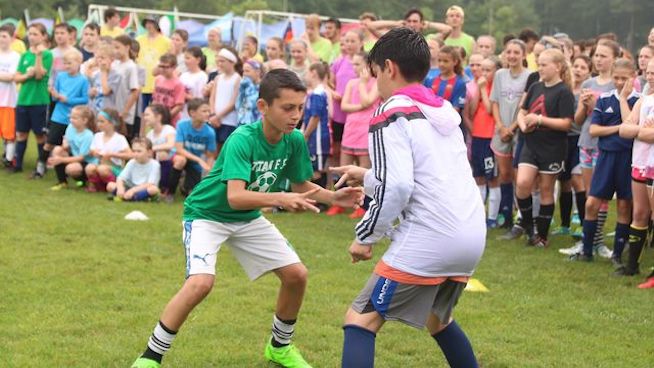
Beyond the given communication with parents as they drop off and pick up their young aspiring players, another strategy that works extremely well is to post as many pictures and videos as possible on your dedicated camp social media outlets.
Do this is as close to real time as possible. This will have the parents feeling as if they are there with their kids. It also gives them a sense of safety and comfort to see their children having the time of their lives.
Shall I mention how easy it is to get exposure when those same parents are liking, commenting and sharing all those posts?
The icing on the cake comes with an end of the day recap email sent to all parents. In my experience, you’ll enjoy 90-plus-percent open rate on these emails, as parents want to know what it was you did with their kids. This short email is a mere highlighting of the day’s events as well as a congratulations to the Camper of the Day.
With a very captive audience, it’s also easy to sell any services, apparel or products you may provide as well as continue to anchor your positive messaging!
At the end of the day: did your camp enrich the lives of the campers and the staff? At the end of the week: is there a tremendous sense of community, self-confidence and love for the game?
If so, job well done! Your camp will grow each and every season, while others fade away.
Photo Credit: matimix/iStock
READ MORE:
RECOMMENDED FOR YOU
MOST POPULAR
5 Keys to Running a Successful Sports Camp
If you were fortunate enough to attend a summer camp for your favorite sport, then you undoubtedly have some fond memories. A smile comes to your face as your mind thinks back to your favorite coach. Maybe you even feel a surge of energy as you summon images of yourself getting better every single day.
Being the coach who affords kids in your town that same opportunity is an amazing thing. The ability to change their lives, and yours, is available for the taking.
The reality is that there are now more sports camps than ever for young athletes. What does it take to run a camp that’s a positive, memorable experience for all involved?
I own and operate World Cup Soccer Camp, one of the most popular soccer-specific camps in New England. WCSC was founded at the request of many parents who were disillusioned and disappointed with the lack of instruction and subsequent lack of improvement offered at previous camps their children had attended. Our three core principles: Character, Skills and Tactics, and Fun, has led hundreds of campers to attend WCSC each year.
In this article, I’d like to highlight five areas I believe key to running a successful sports camp.
I’m not going to lay out a full curriculum for a five-day soccer camp. If you are looking for that kind of information, you probably aren’t the right person to be operating a camp to begin with.
What I’m going to give you is what I believe is the “Secret Sauce” that elevates a sports camp from “meh” to “magnificent.”
The following will allow you to create something so special parents will demand to know the dates for next year’s camp and will instantly enroll their kids the day registration opens in January for a July camp.
1. Don’t Focus on Money

Operating a sports camp can be extremely lucrative. A soccer camp, for example, can be an absolute cash cow. However, that only happens when cash is not your primary goal with your camp.
Parents and athletes know a cash-grab when they see it, and with the current youth sports climate, there are more out there now than ever!
Don’t focus on the money. Set your eyes and heart on serving the kids in your community like no one else!
If you’re going to run a camp, make sure you are doing it to meet the needs of the kids. You can’t go wrong when the focus is building skills and character.
If an athlete leaves feeling their individual skills and tactical knowledge of the game improved, and their parents believe they also built better character and had fun doing so, it’s a home run every time.
Obviously you want to make enough money to cover expenses and turn a profit. But when all of your decisions revolve around those factors, the quality of your camp seriously suffers.
I may spend the least amount of time on this topic, but it could be the most important. Do some soul searching as to why you want to run a sports camp, write it down, and remind yourself of that every single day!
2. The Experience Matters Most

The experience your campers have while in your care is 100% the most important aspect of what you do.
Every moment, every conversation and every interaction should be a positive one. Your campers should have fun, be challenged, gain confidence and build friendships. Every single camper matters.
The experience of your campers is the best advertising you’ll ever get. If they have a positive experience, you’ll create little walking commercials and their parents will tell everyone willing to listen about the camp. This is what I like to call marketing from the inside-out, and it’s how you grow a camp year-over-year.
The experience your campers have will be a reflection of how they are treated, communicated with, and coached. This starts with you, and how you select and treat your own staff.
3. Choose Your Staff Carefully

You may be the heartbeat of your camp, but your staff will be the backbone of your camp.
You want staff who enrich the lives of the campers. However, you also want the staff themselves to have a great experience, as well.
Enrich the lives of your staff, and you’ll have them applying to work with you every season. I believe motivated, positive high school and college athletes often make for the best staffers.
You want a staff that embodies selflessness, servanthood, enthusiasm and positivity. If you can accomplish this, the energy of your camp will be off the hook from check-in on Monday morning until the last camper drives off on the final day.
Once your camp runs long enough, your best staff will often be former campers! They already know the deal! When hiring staff, you’re hiring the person. If they have an insatiable will to help others, they will be a great fit. If they’re just out to make a few extra bucks, they’re not there for the right reasons.
Having a graduated system of advancement will prove critical for your camp as well for the life lessons it can teach your young staff.
At my camps, the ascension to Head Coach looks like this:
1. Leader (Volunteer Position): Leaders earn community service hours. Typically, this position is for 8-12th grade club and HS players.
2. Assistant Coach: Assistant Coach is a paid position given more responsibility than that of the Leaders. These coaches are usually high school or college athletes who’ve proven themselves to be valuable staff.
3. Head Coach: Head Coaches are responsible for their individual teams as well as the Assistant Coach and Leader assigned to them. Assistant Coaches who’ve proven themselves to be fantastic staffers often become a Head Coach.
This system works awesome!
While this delegation of responsibility is important for a smooth camp experience, make sure your staff knows they are all of equal value, no matter what their role.
The experience of each and every camper is dependent on your staffers being the best version of themselves, setting a great example, and teaching the game!
They are a team who will learn to put individual needs and egos aside for several days in order to serve others. It will blow your mind how much a young coach will step up if given the opportunity.
The sense of self-worth and accomplishment along with the greater knowledge of the game they’ll possess by the end of the week will be worth far more to them than the community service hours or paycheck they receive.
4. Have a Theme of The Day

Having a Theme of the Day comes in two distinct forms: character-based themes and participation-based themes.
A character or behavior-based theme to help these little humans grown comes first and foremost. These themes are essentially a single fact or idea you return to throughout the day in order to drive home its importance.
Examples include:
- Attitude: Your attitude, not your aptitude, will determine your altitude. I always like to use this one early in the week and emphasize identifying and rewarding great attitude. You can always control your attitude!
- Patience: The lesson here is that getting better at any skill or sport takes time and effort, and it happens in very small increments. But if you keep at it, those small increments add up over time and make a huge difference.
- It’s Not Luck: The best players did not get to where they are by luck! Remind players that the skills they learn at the camp can be practiced at home, too.
- Be a Hero: Talk to your campers about what it means to be an everyday hero. Smile at people, sit with someone at lunch who’s sitting alone, and helping out at home are all examples of being an everyday hero.
Now take these examples, come up with your own themes (or steal the ones you like best), then Set, Guide and Anchor.
Set the stage in the morning by talking about the theme. Guide the theme throughout the day by looking for opportunities to bring it up. Be super consistent with your messaging! Then, Anchor it down at the end of the day by selecting a Camper of the Day who exemplified your theme.
Then, there’s the participation-based themes.

This is just super fun and cool for the campers. Examples include:
- Crazy Sock Day: Campers arrive to camp with the craziest socks they can conjure.
- Crazy Hat Day: Keep the fun going with having the campers decorate or create crazy hats to bring with them the next morning.
- Dress the Coach Day: This one is a blast for the kids. Best done towards the tail-end of camp, allow the campers to bring in whatever they want their Head Coaches to wear for the second half of the day!
Being part of a team also entails participation as well as encouraging others. Whatever the kids come up with is to be celebrated if they put in the effort!
5. Communication is the Glue

Beyond the given communication with parents as they drop off and pick up their young aspiring players, another strategy that works extremely well is to post as many pictures and videos as possible on your dedicated camp social media outlets.
Do this is as close to real time as possible. This will have the parents feeling as if they are there with their kids. It also gives them a sense of safety and comfort to see their children having the time of their lives.
Shall I mention how easy it is to get exposure when those same parents are liking, commenting and sharing all those posts?
The icing on the cake comes with an end of the day recap email sent to all parents. In my experience, you’ll enjoy 90-plus-percent open rate on these emails, as parents want to know what it was you did with their kids. This short email is a mere highlighting of the day’s events as well as a congratulations to the Camper of the Day.
With a very captive audience, it’s also easy to sell any services, apparel or products you may provide as well as continue to anchor your positive messaging!
At the end of the day: did your camp enrich the lives of the campers and the staff? At the end of the week: is there a tremendous sense of community, self-confidence and love for the game?
If so, job well done! Your camp will grow each and every season, while others fade away.
Photo Credit: matimix/iStock
READ MORE:










